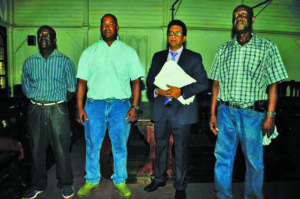…Guyana Appeal Court rules
Guyana’s Court of Appeal last Friday upheld a decision handed down by the High Court, that the decision by President David Granger and his Government to cancel the leases that were issued to farmers by the former Administration was unlawful and unconstitutional.
The land leases were issued for farmers who wished to engage in the usage of the land for agricultural purposes, as outlined within the confines of the established agreement between the State and those who would be leased the land demarcated at Seafield, West Coast Berbice.
Back in December, acting Chief Justice Roxane George, SC, had ruled that President Granger’s revocation of farmers’ leases for lands was unlawful, two years after the affected farmers initially filed action in the court.

The farmers – Phillip Johnson, Rupert Blackman and Rawle Miller – along with their Attorney Anil Nandlall had first moved to the High Court in 2015, challenging the Mahaica Mahaicony Abary/Agriculture Development Authority’s (MMA/ADA) cancellation of State land leases in the rear of Seafield, West Coast Berbice.
Retired Chief Justice Ian Chang had quashed the cancellation of the leases in favour of the farmers in 2016 but they moved to the court once again in April 2016 after President Granger cancelled the leases in March of that year.
The acting Chief Justice handed down decisions in three constitutional challenges. Declaring the President’s revocation of these leases unconstitutional, the Judge awarded G$300,000 in costs against the Attorney General in each of the cases filed by the farmers.
According to Attorney for the plaintiffs, Anil Nandlall, acting Chief Justice George granted several reliefs which supported their Notice of Motion.
The court agreed that under Article 142 of the Constitution of the Cooperative Republic of Guyana, the President’s cancellation of the lease was “contrary to and in violation” of the article, further determining the Head of State’s decision was “unlawful, null, void and of no effect”. Additionally, it was determined that the cancellation of their leases was “compulsorily acquisition” of the Applicant’s leasehold interest without prompt payment or compensation.
The plaintiffs also secured a conservatory order which prohibits the MMM-ADA, its officers or any other State official from entering upon, remaining, occupying or interfering with the Applicant’s quiet and peaceful possession, occupation and enjoyment of lease of State land for agriculture purpose as issued under the relevant laws.
Johnson, Blackman and Miller had claimed that previous President Donald Ramotar granted them their leases in 2014. After the retired acting Chief Justice had ruled in their favour, they saw a notice in a newspaper which had stated: “Notice is hereby given that His Excellency, the President of the Cooperative Republic of Guyana has cancelled all State land leases as described in the Schedules.”
At that time, the three farmers observed that their leases were among those published in the two schedules. They were subsequently removed from their rice lands. The matter was before the former acting Chief Justice, Yonette Cummings-Edwards who was earlier this year transferred to serve in the post of acting Chancellor of the Judiciary. As the matter was stalled, the farmers had complained about how much time had passed before a decision was handed down.
It was in August that six other West Coast Berbice (WCB) rice farmers had mounted a successful legal challenge against the revocation of their leases for lands at Seafield and Number 40 Village which are under MMA-ADA’s control.
Acting Chief Justice George, in her ruling on that matter, observed that those farmers’ leases constituted property under Article 142 of the Constitution, and that the President’s revocation of those leases amounts to depriving the applicants of property without compensating them, as noted in Article 142 of the Constitution.



